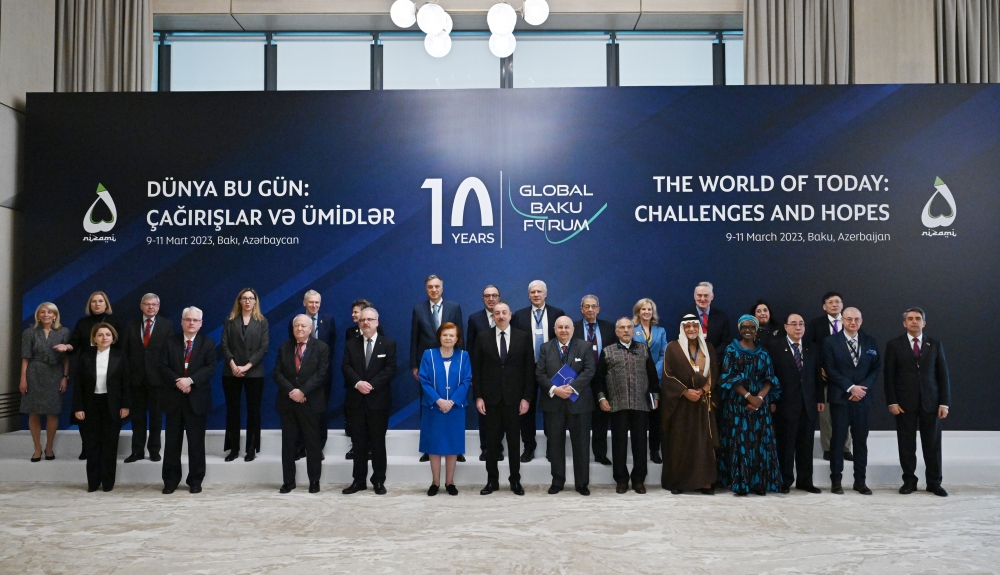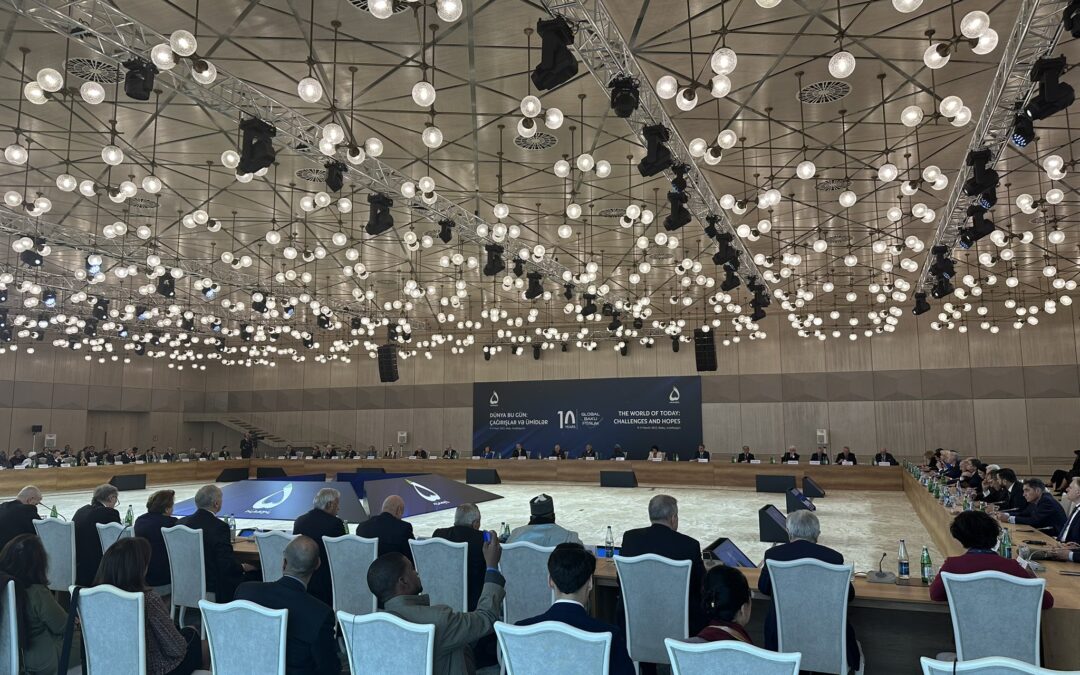Remarks by Mr. Miguel Ángel Moratinos,
the High Representative for the United Nations
Alliance of Civilizations (UNAOC)
at the X Gobal Baku Forum
“The World of Today: Challenges and Hopes
9 March 2023, Baku, Azerbaijan, originally published on www.unaoc.org

Your Excellency,
Mr. Ilham Aliyev,
President of the Republic of Azerbaijan,
Excellencies, dear friends,
At the outset, I warmly thank the Nizami Gangavi International Center (NGIC) for inviting me to address their 10th Global Forum in Baku.
Your Excellency President Aliyev: it’s always a great pleasure to be back to the fascinating city of Baku, the land of fire . I wish to also thank you for receiving me yesterday and for the excellent discussions we had. I look forward to further strengthening the collaboration between Azerbaijan and the United Nations Alliance of Civilizations.
Distinguished guests,
It’s a great honor to be among such a remarkable gathering of the best of minds from all over the world. It’s a testament of the outstanding work of the Nizami Ganjavi International Center under the leadership of the co-chairs H.E. President Vaira Vike-Freiberga and Dr. Ismail Serag-El-Din and the able management of NGIC Secretary General Mr. Rovshan Muradov and his young team.
On the theme of the conference “The world today, challenges and hopes”, allow me to share with you some thoughts :
As an ultimate optimist, I believe that challenges also offer opportunities and hope for change.
The world as we know it has reached a boiling point.
A war crisis with its geopolitical implications is snowballing with no end in sight, a climate disaster, a disastrous economic situation, conflicts that continue to rage and worsen.
Above all human values are in a state of degradation that is not less serious than the continued degradation of our planet.
The alarming rise in bigotry, hate speech and discrimination based on religion, belief , race, ethnicity or gender clearly manifests the absence of compassion, humility, mutual respect and acceptance of the others.
Radical discourse and hate speech have been mainstreamed and have become the new normal.
Far-right extremism has become the fastest growing threat around the world. Hardly one week gets by without a violent incident or a terrorist attack on a religious site or on individuals because of who they are.
Our humanity is in a state of crisis.
The great novelist Charles Dickens wrote in his novel “A Tale of Two Cities” and I quote: “It was the best of times, it was the worst of times… It was the spring of hope, it was the winter of despair.”
Never has humankind reached such level of sophistication in scientific, technological and communications advancement. Never have “Sapiens” advanced as much in biology, medicine, new technologies , let alone the debatable Artificial Intelligence.
Ironically, as much as we are interconnected today, this “spring of hope” is challenged by the winter of war, conflict, exclusion, discrimination, hate, etc.
Where we are today? Yes, we are in 2023. Two decades have already elapsed since the start of this new century because, my dear friends, sometimes we don’t realize that we are living in the 21st century and no longer in the 20th century.
So what has happened during these two decades?
We started the new millennium with great expectations. Heads of State and Government gathering for The Millennium Summit in New York in 2000 to launch a new ambitious global agenda in order to address the real root causes of conflict and crises. To put an end to hunger and poverty, to upgrade education, to address climate change, etc. A year later on 11 September, a band of terrorists kidnapped our best hopes for the future.
In 2003, came the war in Iraq. That war was unjustifiable, illegitimate and devastating for the people of Iraq and the entire region. We are paying the consequences of one of the worst strategic mistakes of humankind in recent history.
It took us more than 15 years to try to redirect our efforts and chart a new course for the future generations. In 2015, the international community endorsed the 2030 agenda for sustainable development. The 17 SDGs became our compass guiding our policies to save the planet and find ways of how we can live together, in peace.
Does this mean we have learned from past mistakes?
I think not.
Once again ,the war in Ukraine have set back this ambitious plan which was already reeling as a result of the pandemic.
The sad reality is that confrontation, bipolarity, mistrust and the fight for hegemony are back on the global scene.
Multilateralism is broken and fragmented and we have been “caged” within the narrow space of “multilateralism à la carte” where few issues could be addressed while the broader quest for peace and creating a better world for future generations remain far-to-reach goals, let alone missing in today’s debate.
That is where we, as UNAOC have re-imagined our mandate: Creating an alliance for peace and how to live together as One Humanity.
But how can we achieve this goal?
Perhaps as a start, we can try to agree on what I believe is obvious.
We are no longer living in the 19th century nor in the 20th century. We are in the 21st century. The West, – I am a fully convinced as a Westerner – has to realize and accept that we are no longer the only actors ruling the world and the rest has to follow.
That doesn’t mean that our values and principles are something of the past. On the contrary. Our principles, as reflected in the Universal Declaration of Human Rights, should be our guiding principles . We should reinforce them, not diminish them.
At the same time we should recognize the existence of other civilizations, cultures and actors, that demand to have their place and say in the new world.
“Towards an Alliance of Peace: Living Together as One Humanity” was the motto of our 9th Global Forum in Fez, Kingdom of Morocco. Many of you present here , contributed to enriching the debates and discussions in this Forum.
Our main take away from this forum is that apart from saving the planet, it is imperative to save humanity.
To adopt a people-centric approach where the human being and the human dimension is at the core of our responses.
Yes, we have challenges to confront. We are witnessing a new form of totalitarianism, ideological, technological, cultural, social, religious. But, at the end of the day, whether this tendency of totalitarianism is coming from the East or from the West, from ideological ideas or from technological developments, we should not forget that we, citizens of the world, we “Sapiens”, we are the ones that can defend and protect our own future as human beings.
That is our main task and this is where UNAOC come into play.
At the global level, UNAOC will continue to develop a strategy of engagement and dialogue with all the different actors, cultures and religions and civilizations, inclusive of all.
UNAOC will work on identifying the synergies and the convergences, but also to deconstruct the controversies and address them in a meaningful way.
At the microlevel, UNAOC will continue to promote its initiatives on prevention and mediation in identity-based conflicts.
We are moving forward in the right direction.
Protecting bio-diversity is essential for survival of our planet but protecting “cultu-diversi” or cultural diversity is also essential for the saving our humanity.
I wish to conclude by recalling the great poet Nizami Ganjavi where Humanity was the motif at the very heart of Nizami’s poetry. To him, humanity was his sacred mission in the service of his people. In this lies the immortality and eternal youth of Nizami’s art through the centuries.
Very inspiring, indeed.
I congratulate Nizami Ganjavi International Center on the occasion of their 10th anniversary and wish them more success in the next 10 years
Thank you.


